Abstract
We have examined the effects of 1,25 dihydroxyvitamin D3 (1,25[OH]2D3) and a low calcemic analogue EB1089 on parathyroid hormone-related peptide (PTHRP) production and on the development of hypercalcemia in Fischer rats implanted with the Leydig cell tumor H-500. Leydig cell tumors were implanted subcutaneously into male Fischer rats, which received constant infusions intraperitoneally of either 1,25(OH)2D3 (50-200 pmol/24 h), EB1089 (50-400 pmol/24 h), or vehicle for up to 4 wk. A control group of animals received similar infusions without tumor implantation. Plasma calcium, plasma levels of immunoreactive iPTHRP, and tumor PTHRP mRNA levels were determined as well as tumor size, animal body weight, and animal survival time. Non-tumor-bearing animals receiving > 50 pmol/24 h of 1,25(OH)2D3 became hypercalcemic, whereas no significant change in plasma calcium was observed in animals receiving < or = 200 pmol/24 h of EB1089. Tumor-bearing animals receiving vehicle alone or > 50 pmol/24 h of 1,25(OH)2D3 became severely hypercalcemic within 15 d. However, animals treated with low dose 1,25(OH)2D3 and all doses of EB1089 maintained near-normal or normal levels of plasma calcium for up to 4 wk. Additionally, reduced levels of tumor PTHRP mRNA and of plasma iPTHRP were observed compared with controls in both vitamin D- and EB1089-treated rats. Infusion of 50 pmol/24 h of 1,25(OH)2D3 and 200 pmol/24 h of EB1089 significantly reduced tumor volume by the end of experiment. The analogue but not 1,25(OH)2D3 substantially prolonged survival time in tumor-bearing animals with longer survival achieved at the highest dose, 400 pmol/24 h, of EB1089. These studies demonstrate that 1,25(OH)2D3 and a low calcemic vitamin D analogue are potent inhibitors of PTHRP production in vivo. Low calcemic analogues may therefore represent important alternative therapy for malignancy-associated hypercalcemia.
Full text
PDF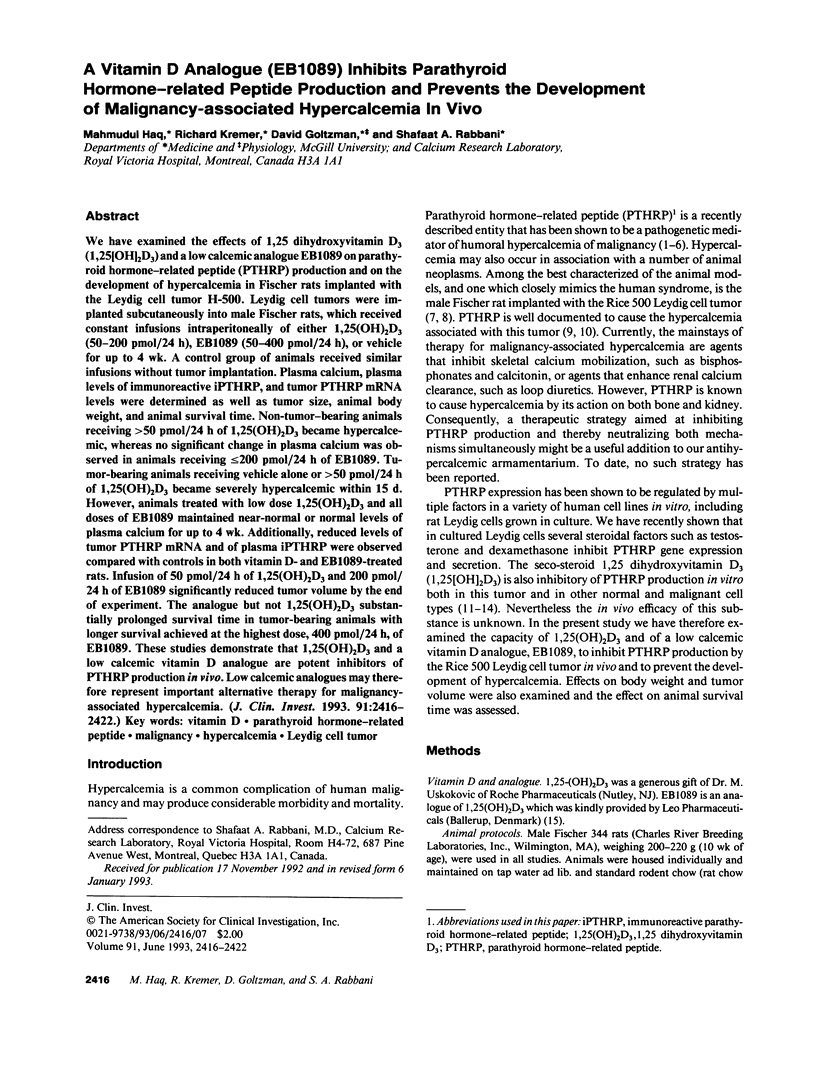
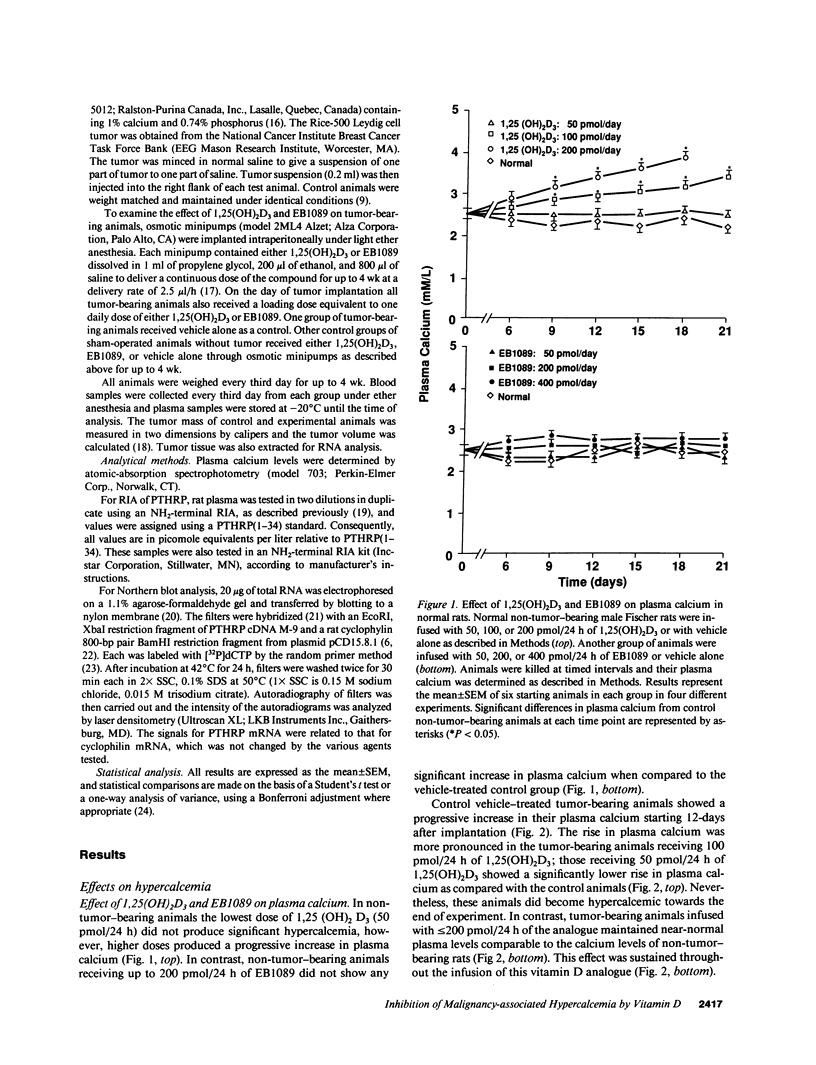
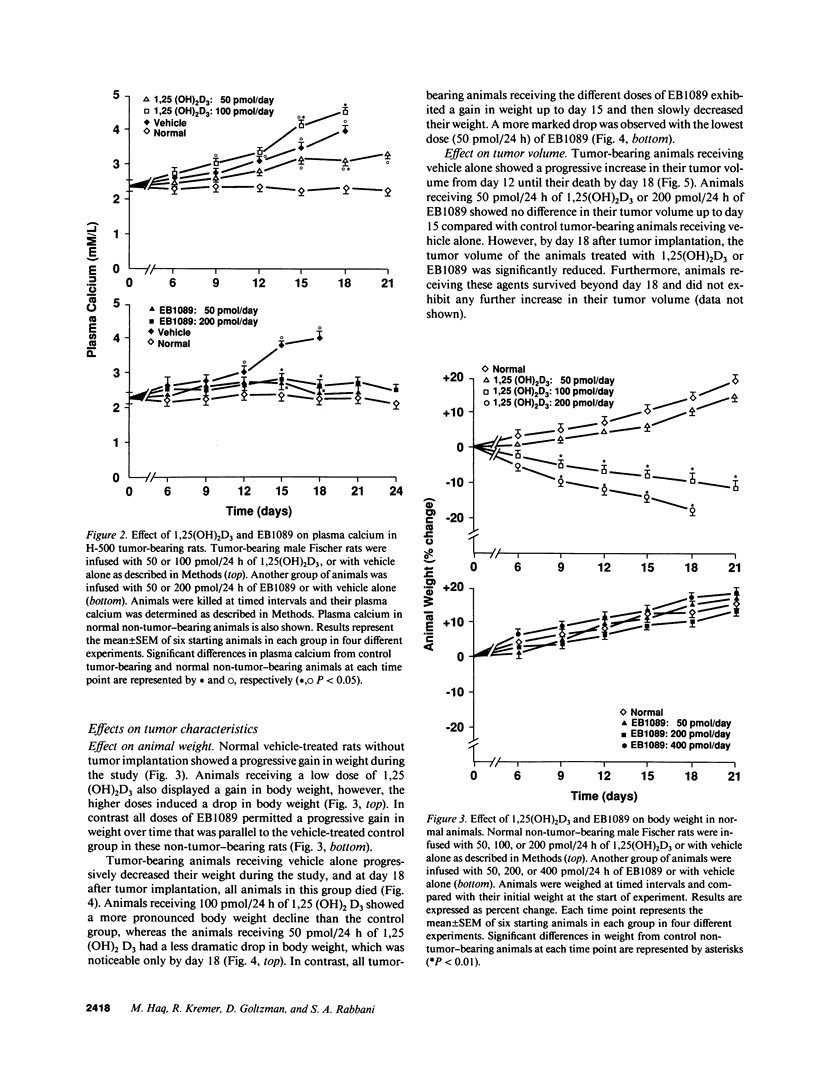
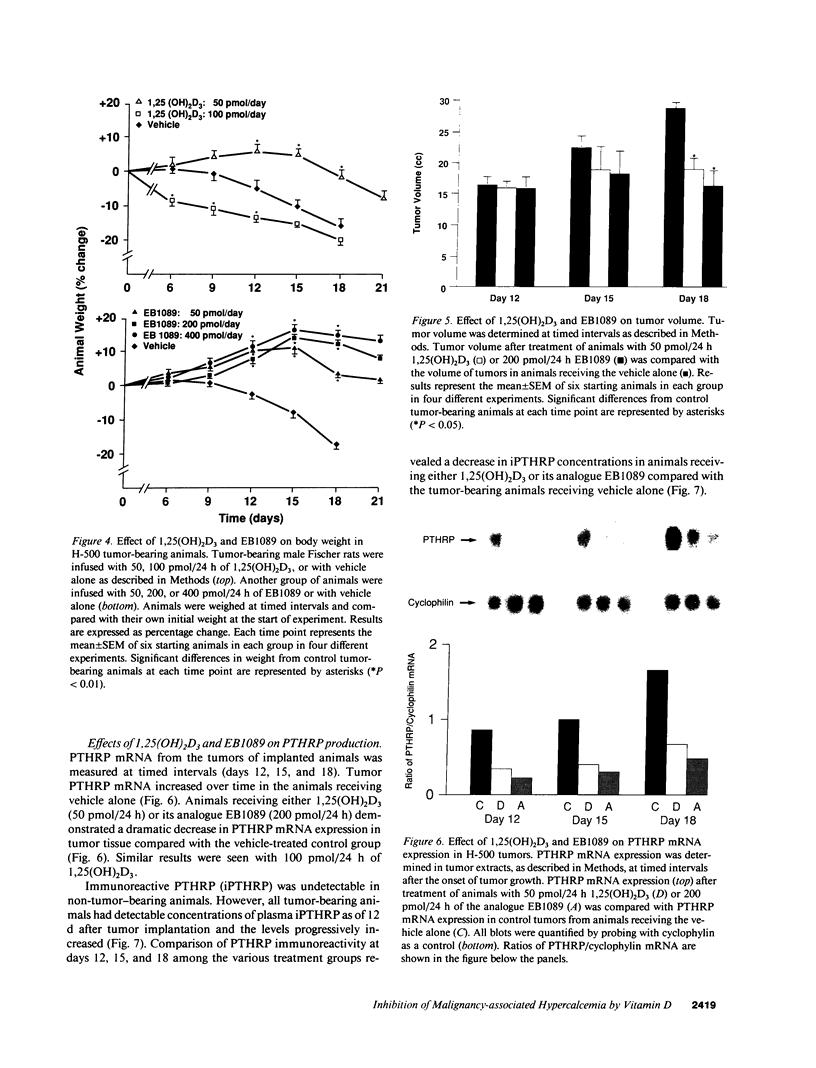
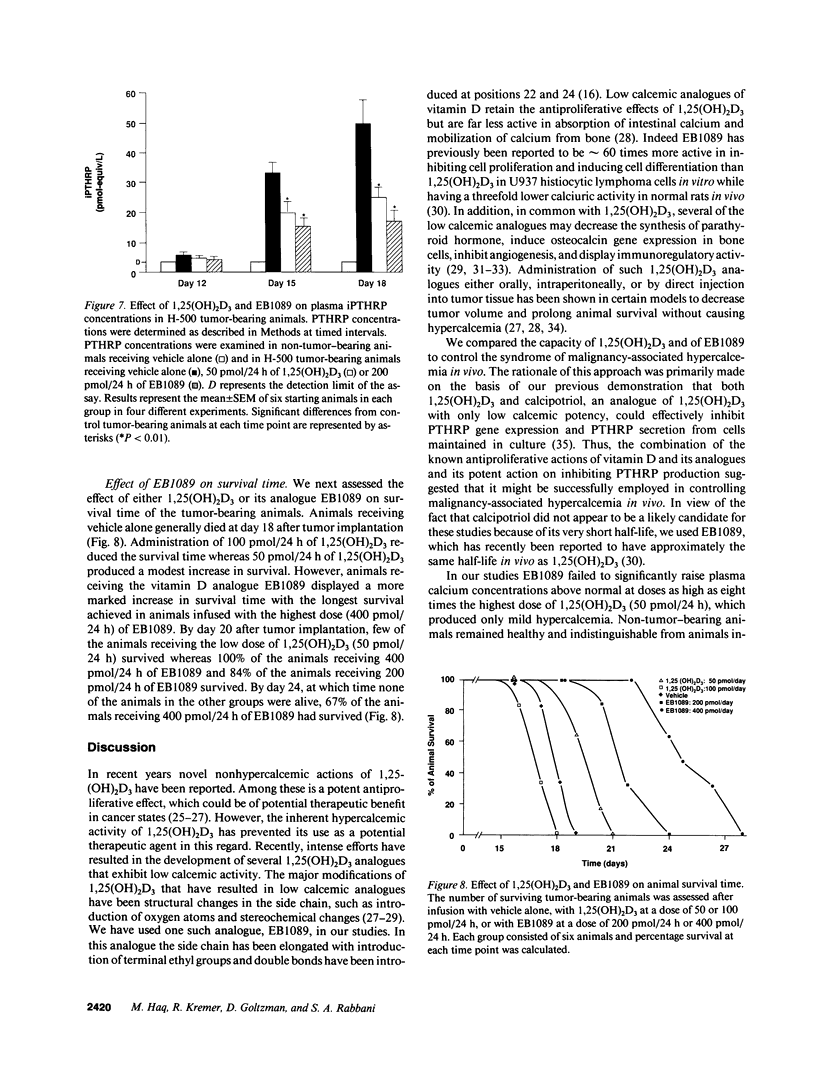
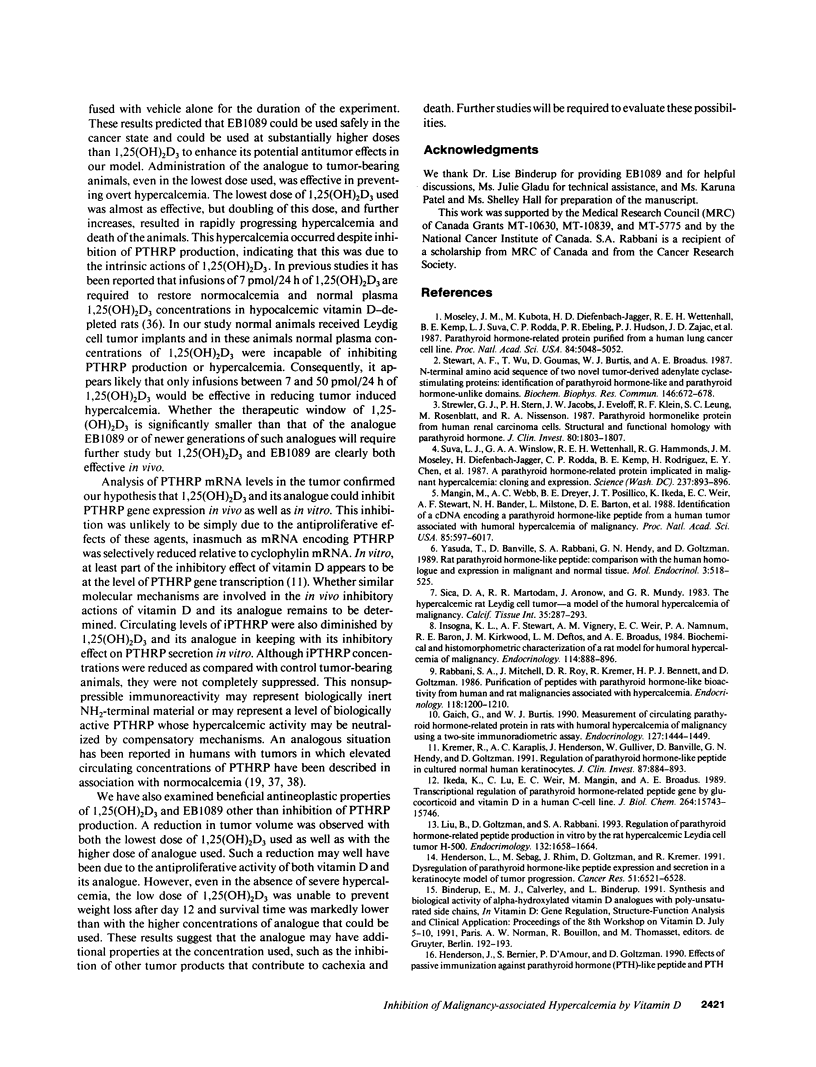
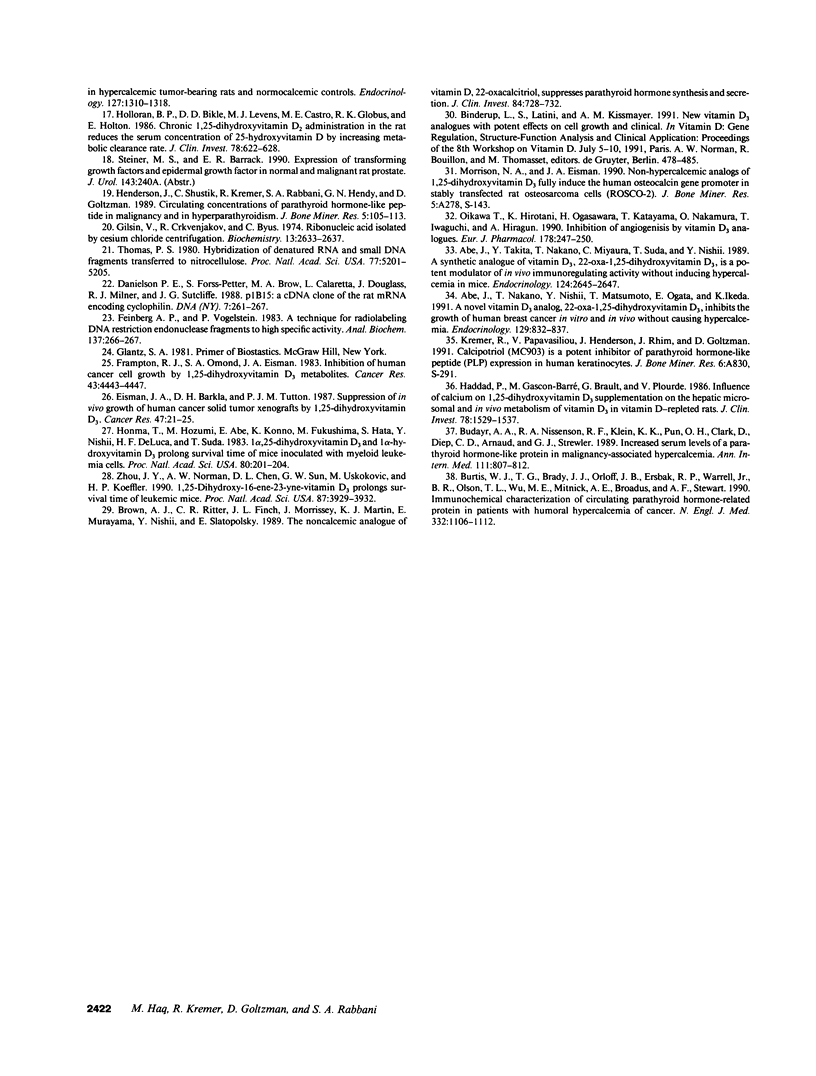
Images in this article
Selected References
These references are in PubMed. This may not be the complete list of references from this article.
- Abe J., Nakano T., Nishii Y., Matsumoto T., Ogata E., Ikeda K. A novel vitamin D3 analog, 22-oxa-1,25-dihydroxyvitamin D3, inhibits the growth of human breast cancer in vitro and in vivo without causing hypercalcemia. Endocrinology. 1991 Aug;129(2):832–837. doi: 10.1210/endo-129-2-832. [DOI] [PubMed] [Google Scholar]
- Abe J., Takita Y., Nakano T., Miyaura C., Suda T., Nishii Y. A synthetic analogue of vitamin D3, 22-oxa-1 alpha,25-dihydroxyvitamin D3, is a potent modulator of in vivo immunoregulating activity without inducing hypercalcemia in mice. Endocrinology. 1989 May;124(5):2645–2647. doi: 10.1210/endo-124-5-2645. [DOI] [PubMed] [Google Scholar]
- Brown A. J., Ritter C. R., Finch J. L., Morrissey J., Martin K. J., Murayama E., Nishii Y., Slatopolsky E. The noncalcemic analogue of vitamin D, 22-oxacalcitriol, suppresses parathyroid hormone synthesis and secretion. J Clin Invest. 1989 Sep;84(3):728–732. doi: 10.1172/JCI114229. [DOI] [PMC free article] [PubMed] [Google Scholar]
- Budayr A. A., Nissenson R. A., Klein R. F., Pun K. K., Clark O. H., Diep D., Arnaud C. D., Strewler G. J. Increased serum levels of a parathyroid hormone-like protein in malignancy-associated hypercalcemia. Ann Intern Med. 1989 Nov 15;111(10):807–812. doi: 10.7326/0003-4819-111-10-807. [DOI] [PubMed] [Google Scholar]
- Burtis W. J., Brady T. G., Orloff J. J., Ersbak J. B., Warrell R. P., Jr, Olson B. R., Wu T. L., Mitnick M. E., Broadus A. E., Stewart A. F. Immunochemical characterization of circulating parathyroid hormone-related protein in patients with humoral hypercalcemia of cancer. N Engl J Med. 1990 Apr 19;322(16):1106–1112. doi: 10.1056/NEJM199004193221603. [DOI] [PubMed] [Google Scholar]
- Danielson P. E., Forss-Petter S., Brow M. A., Calavetta L., Douglass J., Milner R. J., Sutcliffe J. G. p1B15: a cDNA clone of the rat mRNA encoding cyclophilin. DNA. 1988 May;7(4):261–267. doi: 10.1089/dna.1988.7.261. [DOI] [PubMed] [Google Scholar]
- Eisman J. A., Barkla D. H., Tutton P. J. Suppression of in vivo growth of human cancer solid tumor xenografts by 1,25-dihydroxyvitamin D3. Cancer Res. 1987 Jan 1;47(1):21–25. [PubMed] [Google Scholar]
- Feinberg A. P., Vogelstein B. "A technique for radiolabeling DNA restriction endonuclease fragments to high specific activity". Addendum. Anal Biochem. 1984 Feb;137(1):266–267. doi: 10.1016/0003-2697(84)90381-6. [DOI] [PubMed] [Google Scholar]
- Frampton R. J., Omond S. A., Eisman J. A. Inhibition of human cancer cell growth by 1,25-dihydroxyvitamin D3 metabolites. Cancer Res. 1983 Sep;43(9):4443–4447. [PubMed] [Google Scholar]
- Gaich G., Burtis W. J. Measurement of circulating parathyroid hormone-related protein in rats with humoral hypercalcemia of malignancy using a two-site immunoradiometric assay. Endocrinology. 1990 Sep;127(3):1444–1449. doi: 10.1210/endo-127-3-1444. [DOI] [PubMed] [Google Scholar]
- Glisin V., Crkvenjakov R., Byus C. Ribonucleic acid isolated by cesium chloride centrifugation. Biochemistry. 1974 Jun 4;13(12):2633–2637. doi: 10.1021/bi00709a025. [DOI] [PubMed] [Google Scholar]
- Haddad P., Gascon-Barré M., Brault G., Plourde V. Influence of calcium or 1,25-dihydroxyvitamin D3 supplementation on the hepatic microsomal and in vivo metabolism of vitamin D3 in vitamin D-depleted rats. J Clin Invest. 1986 Dec;78(6):1529–1537. doi: 10.1172/JCI112745. [DOI] [PMC free article] [PubMed] [Google Scholar]
- Halloran B. P., Bikle D. D., Levens M. J., Castro M. E., Globus R. K., Holton E. Chronic 1,25-dihydroxyvitamin D3 administration in the rat reduces the serum concentration of 25-hydroxyvitamin D by increasing metabolic clearance rate. J Clin Invest. 1986 Sep;78(3):622–628. doi: 10.1172/JCI112619. [DOI] [PMC free article] [PubMed] [Google Scholar]
- Henderson J. E., Shustik C., Kremer R., Rabbani S. A., Hendy G. N., Goltzman D. Circulating concentrations of parathyroid hormone-like peptide in malignancy and in hyperparathyroidism. J Bone Miner Res. 1990 Feb;5(2):105–113. doi: 10.1002/jbmr.5650050203. [DOI] [PubMed] [Google Scholar]
- Henderson J., Bernier S., D'Amour P., Goltzman D. Effects of passive immunization against parathyroid hormone (PTH)-like peptide and PTH in hypercalcemic tumor-bearing rats and normocalcemic controls. Endocrinology. 1990 Sep;127(3):1310–1318. doi: 10.1210/endo-127-3-1310. [DOI] [PubMed] [Google Scholar]
- Henderson J., Sebag M., Rhim J., Goltzman D., Kremer R. Dysregulation of parathyroid hormone-like peptide expression and secretion in a keratinocyte model of tumor progression. Cancer Res. 1991 Dec 15;51(24):6521–6528. [PubMed] [Google Scholar]
- Honma Y., Hozumi M., Abe E., Konno K., Fukushima M., Hata S., Nishii Y., DeLuca H. F., Suda T. 1 alpha,25-Dihydroxyvitamin D3 and 1 alpha-hydroxyvitamin D3 prolong survival time of mice inoculated with myeloid leukemia cells. Proc Natl Acad Sci U S A. 1983 Jan;80(1):201–204. doi: 10.1073/pnas.80.1.201. [DOI] [PMC free article] [PubMed] [Google Scholar]
- Ikeda K., Lu C., Weir E. C., Mangin M., Broadus A. E. Transcriptional regulation of the parathyroid hormone-related peptide gene by glucocorticoids and vitamin D in a human C-cell line. J Biol Chem. 1989 Sep 25;264(27):15743–15746. [PubMed] [Google Scholar]
- Insogna K. L., Stewart A. F., Vignery A. M., Weir E. C., Namnum P. A., Baron R. E., Kirkwood J. M., Deftos L. M., Broadus A. E. Biochemical and histomorphometric characterization of a rat model for humoral hypercalcemia of malignancy. Endocrinology. 1984 Mar;114(3):888–896. doi: 10.1210/endo-114-3-888. [DOI] [PubMed] [Google Scholar]
- Kremer R., Karaplis A. C., Henderson J., Gulliver W., Banville D., Hendy G. N., Goltzman D. Regulation of parathyroid hormone-like peptide in cultured normal human keratinocytes. Effect of growth factors and 1,25 dihydroxyvitamin D3 on gene expression and secretion. J Clin Invest. 1991 Mar;87(3):884–893. doi: 10.1172/JCI115094. [DOI] [PMC free article] [PubMed] [Google Scholar]
- Liu B., Goltzman D., Rabbani S. A. Regulation of parathyroid hormone-related peptide production in vitro by the rat hypercalcemic Leydig cell tumor H-500. Endocrinology. 1993 Apr;132(4):1658–1664. doi: 10.1210/endo.132.4.8462465. [DOI] [PubMed] [Google Scholar]
- Mangin M., Webb A. C., Dreyer B. E., Posillico J. T., Ikeda K., Weir E. C., Stewart A. F., Bander N. H., Milstone L., Barton D. E. Identification of a cDNA encoding a parathyroid hormone-like peptide from a human tumor associated with humoral hypercalcemia of malignancy. Proc Natl Acad Sci U S A. 1988 Jan;85(2):597–601. doi: 10.1073/pnas.85.2.597. [DOI] [PMC free article] [PubMed] [Google Scholar]
- Moseley J. M., Kubota M., Diefenbach-Jagger H., Wettenhall R. E., Kemp B. E., Suva L. J., Rodda C. P., Ebeling P. R., Hudson P. J., Zajac J. D. Parathyroid hormone-related protein purified from a human lung cancer cell line. Proc Natl Acad Sci U S A. 1987 Jul;84(14):5048–5052. doi: 10.1073/pnas.84.14.5048. [DOI] [PMC free article] [PubMed] [Google Scholar]
- Oikawa T., Hirotani K., Ogasawara H., Katayama T., Nakamura O., Iwaguchi T., Hiragun A. Inhibition of angiogenesis by vitamin D3 analogues. Eur J Pharmacol. 1990 Mar 20;178(2):247–250. doi: 10.1016/0014-2999(90)90483-m. [DOI] [PubMed] [Google Scholar]
- Rabbani S. A., Mitchell J., Roy D. R., Kremer R., Bennett H. P., Goltzman D. Purification of peptides with parathyroid hormone-like bioactivity from human and rat malignancies associated with hypercalcemia. Endocrinology. 1986 Mar;118(3):1200–1210. doi: 10.1210/endo-118-3-1200. [DOI] [PubMed] [Google Scholar]
- Sica D. A., Martodam R. R., Aronow J., Mundy G. R. The hypercalcemic rat Leydig cell tumor--a model of the humoral hypercalcemia of malignancy. Calcif Tissue Int. 1983 May;35(3):287–293. doi: 10.1007/BF02405048. [DOI] [PubMed] [Google Scholar]
- Stewart A. F., Wu T., Goumas D., Burtis W. J., Broadus A. E. N-terminal amino acid sequence of two novel tumor-derived adenylate cyclase-stimulating proteins: identification of parathyroid hormone-like and parathyroid hormone-unlike domains. Biochem Biophys Res Commun. 1987 Jul 31;146(2):672–678. doi: 10.1016/0006-291x(87)90581-x. [DOI] [PubMed] [Google Scholar]
- Strewler G. J., Stern P. H., Jacobs J. W., Eveloff J., Klein R. F., Leung S. C., Rosenblatt M., Nissenson R. A. Parathyroid hormonelike protein from human renal carcinoma cells. Structural and functional homology with parathyroid hormone. J Clin Invest. 1987 Dec;80(6):1803–1807. doi: 10.1172/JCI113275. [DOI] [PMC free article] [PubMed] [Google Scholar]
- Suva L. J., Winslow G. A., Wettenhall R. E., Hammonds R. G., Moseley J. M., Diefenbach-Jagger H., Rodda C. P., Kemp B. E., Rodriguez H., Chen E. Y. A parathyroid hormone-related protein implicated in malignant hypercalcemia: cloning and expression. Science. 1987 Aug 21;237(4817):893–896. doi: 10.1126/science.3616618. [DOI] [PubMed] [Google Scholar]
- Thomas P. S. Hybridization of denatured RNA and small DNA fragments transferred to nitrocellulose. Proc Natl Acad Sci U S A. 1980 Sep;77(9):5201–5205. doi: 10.1073/pnas.77.9.5201. [DOI] [PMC free article] [PubMed] [Google Scholar]
- Yasuda T., Banville D., Rabbani S. A., Hendy G. N., Goltzman D. Rat parathyroid hormone-like peptide: comparison with the human homologue and expression in malignant and normal tissue. Mol Endocrinol. 1989 Mar;3(3):518–525. doi: 10.1210/mend-3-3-518. [DOI] [PubMed] [Google Scholar]
- Zhou J. Y., Norman A. W., Chen D. L., Sun G. W., Uskokovic M., Koeffler H. P. 1,25-Dihydroxy-16-ene-23-yne-vitamin D3 prolongs survival time of leukemic mice. Proc Natl Acad Sci U S A. 1990 May;87(10):3929–3932. doi: 10.1073/pnas.87.10.3929. [DOI] [PMC free article] [PubMed] [Google Scholar]











